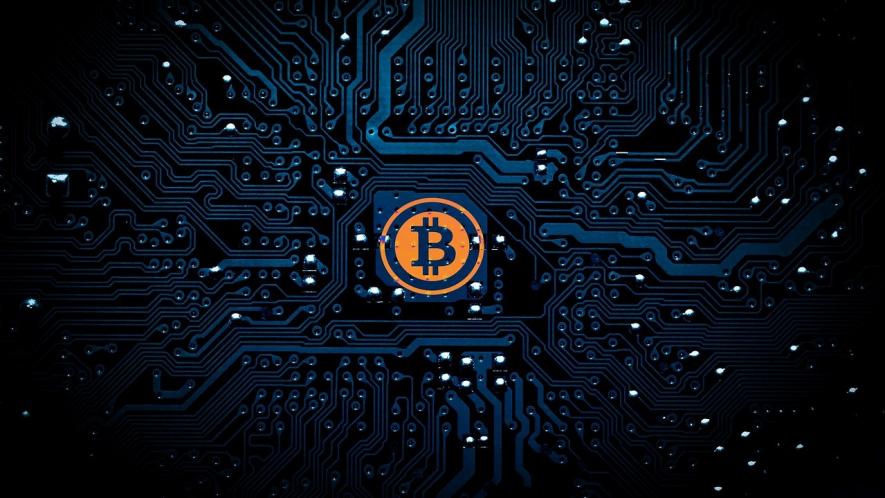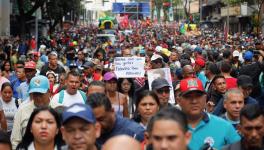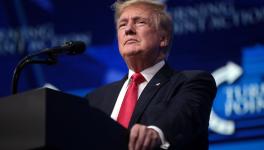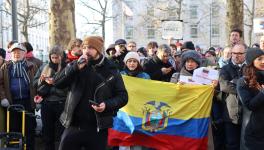As Bitcoin Continues Volatile Journey, Venezuela to Launch its Own Cryptocurrency

The Bitcoin saga is becoming murkier even as the volatile cryptocurrency's prices have climbed to dizzying heights in the recent weeks. Financial regulators have been taking measures that have given rise to doubts about the future of cryptocurrencies as money, and now the government of Venezuela has announced its own cryptocurrency – ‘petro’.
Sharply rising prices
Bitcoin prices were just around $20 per bitcoin in February 2013 and crossed $1000 per bitcoin during late November 2013. Prices crashed since then to about $233 in February 2015. Prices began rising from late 2015 and crossed $1000 again in early January 2017. Since then bitcoin prices have risen steeply, crossing $5000 in October 2017, and further to above $10,000 in the last few days. On 3 December, the closing price was $11,181 per bitcoin. (See chart at the end)
The cumulative value of the bitcoins in the world have gone up sharply as prices rose. The total market capitalisation of bitcoins, which was over $12 billion in February 2014, stood at more than $185 billion at close on 3 December 2017. In comparison, the total value of US dollars in circulation was $1.59 trillion as of 15 November 2017.
All these have led many to toy with the idea that the cryptocurrency might even emerge as an alternative to established currencies.
'Alternative currency' or yet another asset witnessing a speculative boom?
Yet, one of the most obvious weaknesses of bitcoin in claiming the mantle of an "alternative currency" is its high volatility. If money is supposed to serve the functions of being a medium of exchange, a store of value and a unit of account as most standard textbooks would tell us, a "currency" the value of which fluctuates as much as bitcoin can hardly serve the purpose. While some observers have mooted, in the past, the possibility that bitcoin prices might stabilise at some future time, clearly we are nowhere near that point.
Thus bitcoin has been showing the characteristics of yet another asset which has attracted a lot of interest from speculators.
Analysts have compared the "speculative mania" around bitcoin to other bubbles in history, such as the Tulip bubble in the Netherlands which occurred in 1637.
The regulatory eye
The higher visibility that bitcoin and other cryptocurrencies such as Ethereum have gained in the recent past have also attracted more attention from governments and regulators around the world. The announcement by various exchange operators that they would launch bitcoin futures trading will surely bring more regulatory scrutiny. The Chicago-headquartered CBOE Global Markets has announced that it would start bitcoin futures trading on 10 December, while New York-based NASDAQ is to launch bitcoin futures next year.
Meanwhile the US Securities and Exchange Commission has filed fraud charges against Canadian businessmen Dominic Lacroix and his company PlexCorps for allegedly defrauding investors via a so-called initital coin offering (ICO), the Financial Times reported. (ICO is a means of crowdfunding the release of a new cryptocurrency.)
"The complaint alleges that Lacroix and PlexCorps have been marketing and selling securities called PlexCoin and claiming that investments in the product would generate a 1354 per cent return in less than 29 days," said the report.
In India, the RBI has banned transactions in the country using cryptocurrencies. Buying and selling cryptocurrencies on online exchanges is permitted, but using them to pay for goods and services within India is not allowed. A panel that the government constituted to study the issue had submitted its report in August, but its contents have not been made public yet.
Venezuela moves to create its own cryptocurrency
The announcement by Venezuelan President Nicolás Maduro that the country would launch a digital currency to circumvent US-led sanctions has provided the latest twist in the cryptocurrency tale. The cryptocurrency – called the "petro" – will be backed by Venezuelan reserves of gold, oil, gas and diamonds, Maduro said in his regular televised Sunday broadcast.
To succeed, petro will have to be far more stable in value than bitcoin has been, and the backing of the government of Venezuela would seek to ensure precisely this. The main objective would be to make use of the kind of advantages that cryptocurrencies offer in terms of encryption – which the Venezuelan government hopes would help it tide over the sanction-imposed difficulties in moving money through international banks.
Who should control currencies?
Cryptocurrencies typically haven't been state-backed, and the question whether a viable currency can emerge (and whether they should be allowed to exist) in the modern world without the backing of the state – ultimately buttressed by the power to enforce laws – is being hotly debated.
Venezuela's move which marks a departure from the trend so far will provide a new angle to the debate. A relevant question here is, who would ultimately exercise control over cryptocurrencies such as bitcoin? One claim that is made is that the Bitcoin network is decentralised and free of control by a central authority, and that this is somehow better than the existing system of fiat currencies controlled by central banks. But this masks the fact that "minting" bitcoins (the process of creating new bitcoins) requires enormous computing power, which does not come cheap. This in turn means that people and entities with resources to access such computing power – read the super-rich and the big corporates – are certainly at an advantage once they get into the act in a full-fledged manner. This is different from the case when a currency is controlled by the state, which at least potentially could be obliged to be subject to democratic checks and balances.
Get the latest reports & analysis with people's perspective on Protests, movements & deep analytical videos, discussions of the current affairs in your Telegram app. Subscribe to NewsClick's Telegram channel & get Real-Time updates on stories, as they get published on our website.
























